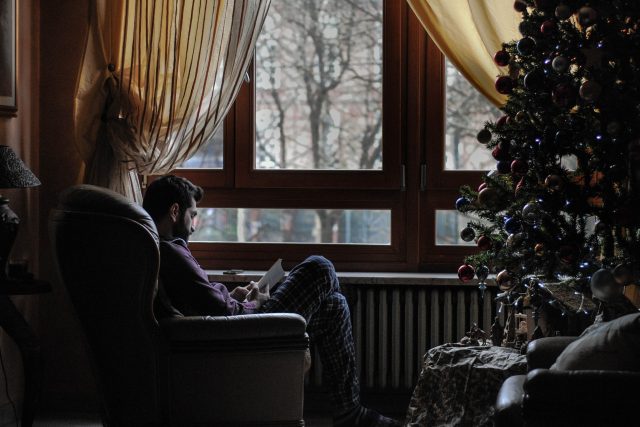Managing the Holidays with PTSD
By: Natalie Rice-Thorp, Ph.D. | December 22, 2023

If you are struggling with Post Traumatic Stress Disorder (PTSD) symptoms, and feeling anxious about the upcoming holidays, you are not alone. Large gatherings of loved ones, crowded stores, and big, bustling events with loud sounds can be overstimulating. This, combined with the added pressure around the holidays to join in and enjoy the festivities can increase trauma related symptoms. If you are experiencing feelings of worry or dread this holiday season, there are ways to ease your symptoms and help you stay present.
The tips listed below will help you navigate this challenging time:
1. Manage Your Expectations
How you feel and function during this season is not necessarily how future holidays will be for you. This is just for now. Be gentle with yourself and try not to compare your experiences this season to past or imagined future seasons. Practice mindfulness to focus on just this moment and center yourself.
Being gentle with ourselves means giving ourselves permission not to be the best that’s humanly possible, but rather to do the best we can right now.
The holidays can be stressful enough without adding extra pressure to have picture perfect experiences. Everyone will go through difficult times at some points in their lives. This is one of those times for you. It is okay to do things differently than you have done in the past.
2. Challenge Critical, Judgmental Thoughts
You can reduce feelings of guilt, shame, and embarrassment by not blindly believing self-judgmental thoughts. If you hear yourself saying “you should” or “you shouldn’t,” there’s a good chance that you are about to say something invalidating to yourself.
Saying “you should just be grateful” or “you should be enjoying this” can make the situation worse by piling guilt and shame on top of anxiety and fear.
If you hear yourself saying all-or-nothing thoughts, there’s a good chance that thought is not going to be entirely accurate. Words such as “always” and “never” are not likely to be accurate or helpful in these situations.
3. Identify the Most Important Aspects of the Holiday and Work From There
This may not be the be year that you do all the holiday things, and that is okay. When you are struggling with PTSD symptoms, you are not operating at full range of capacity because your system has diverted a lot of resources to being alert to keep you safe.
Imagine that you have access to only half a tank of gas in your car. You wouldn’t expect to make unlimited stops on a road trip. You would need to be selective about how to use the fuel you have at your disposal.
This season, prioritize the activities that matter the most to you.
If, for example, you value spending time in a house of worship, you might choose to spend time in the decorated house of worship during off hours instead of attending a crowded religious service on the actual holiday. If you value seeing holiday lights with a loved one, you might choose to visit a smaller neighborhood light display on a weeknight versus a crowded, larger display on the weekend. If you value baking, you might decorate premade baked goods, use premade dough, or make a smaller batch versus making large batches of goodies.
4. Think Small Steps
The holidays are full of unexpected scheduling changes, disrupted sleep patterns, dealing with difficult family members, traveling, and changes in eating patterns.
When you feel overwhelmed, go back to the basics: focus on Getting a Good Night’s Sleep, Eating to Feel Good, incorporating healthy movement into your routine, and taking breaks when you need them. Practicing Mindfulness for Holiday Stress will help you slow down and rejuvenate yourself.
If your goals are too ambitious, you are more likely to try to escape or avoid the necessary steps to reach those goals. Focus on taking small steps, just for now. If you think “yeah, but it’s not the same/enough…” remember, this isn’t necessarily how it is always going to be.
Progress is not all-or-nothing. Remember, little steps add up to big ones.
5. Practice Self-Compassion
Although we cannot make the pain simply “go away,” we can ease our suffering by ridding ourselves of the layers of critical judgements we place on ourselves. Inviting self-compassion protects us from the negative effects of self-judgment and criticism. You can learn How to Cultivate Self-Compassion by reminding yourself that you are in a challenging situation, and you are doing the best you can with the tools you currently have. Accept that you may not approach the holidays the same way you did before your trauma. Speak kindly to yourself the same way you would talk to a dear friend and be patient with yourself. Practice being your own cheerleader, you got this!
Give yourself permission to understand the recovery process from PTSD, rather than kicking yourself for not being festive enough.
Help is Available!
Whether you need additional supporting learning How to Cope with Holiday Stress, understanding and treating trauma, or managing panic attacks, the team at Therapy Changes is here for you.
There are effective treatments available that can help you significantly reduce your PTSD symptoms. Cognitive behavioral treatments such as Prolonged Exposure (PE) as a Treatment Option for PTSD and Cognitive Processing Therapy (CPT) are two gold standard treatments offered at Therapy Changes. If you are a loved one, working with a therapist that specializes in trauma and PTSD can help you learn How to Help a Loved One Through Trauma.
Working with a professional San Diego Psychologist at Therapy Changes will help you navigate through this holiday season and learn tools and strategies to help you feel more like yourself by the next holiday season.
Contact Us to learn more about How Therapy Works and What to Expect and to schedule an appointment. You don’t have to do this alone; take the first step and reach out today.
Photo by Paola Chaaya on Unsplash



